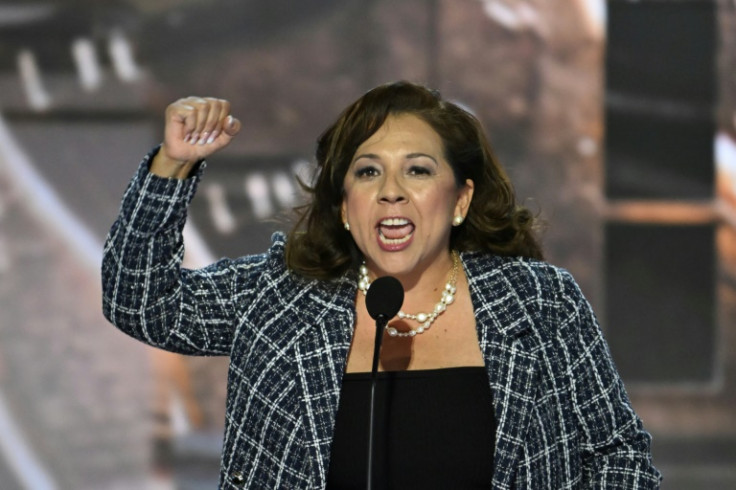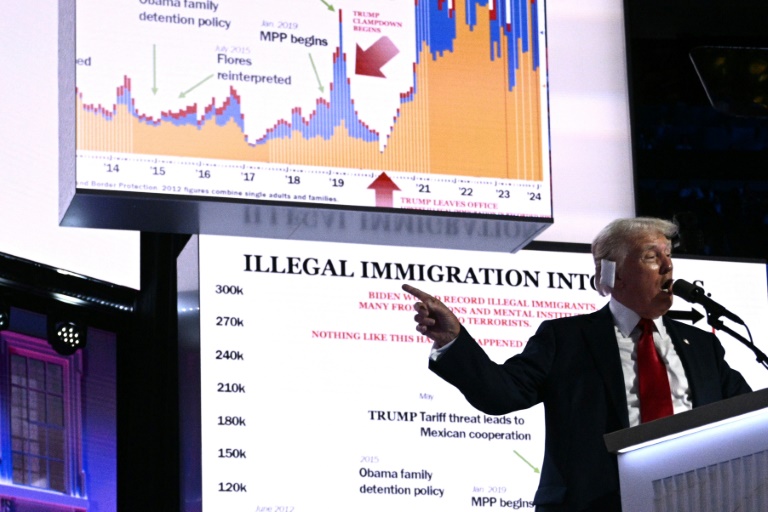A naturalized US citizen, Nicaraguan-born Linda Fornos believes uncontrolled immigration is harming her family’s ability to care for itself, and says she will be casting her ballot for Donald Trump in November — having voted Democrat in 2020.
Latino voters represent the fastest-growing racial and ethnic group of eligible US voters, and one that traditionally has favored the Democratic ticket in presidential elections.
But polls show an increasing number of Latinos like Fornos switching allegiance — a trend that poses an enormous challenge for Vice President Kamala Harris in the 100 days she has left to counter the lure of Trump and his hard-line border policies.
Fornos, who has lived in the United States for 16 years, addressed the Republican National Convention in Milwaukee in mid-July, making the case that the “Biden economy” had made life nearly impossible for her and her family.
“One of my sons works three jobs, and the other holds down two. That makes six jobs for three people just to survive in Biden’s economy,” she said. “Our open borders are making this problem worse.”
She added: “It’s upsetting to see million of dollars being spent to help immigrants who came here illegally while hard-working families who did it the right way are left struggling.”
Nearly 64 million people of Hispanic descent live in the United States, roughly 20 percent of the population, according to 2022 figures.
Thirty-six million of them are eligible to vote, according to the Pew Research Center.
And of the estimated 16.5 million who voted in 2020, 59 percent supported the Democratic candidate, Joe Biden.
But if some Democrats expected Trump’s campaign vow of mass deportations of undocumented immigrants — or his denunciations of those migrants as rapists and criminals — to offend Latino voters, people like Fornos support him.
“The fact is that illegal immigration hurts legal immigrants the most,” she said.
Democrats have seen their dominance among Latino voters steadily ebb, from a three-to-one edge in the 1970s to roughly two-to-one today, said Benjamin Marquez, a University of Wisconsin political scientist.
The Republican strategy now, he said, is not to win the Latino vote outright but to “shave off enough Latino votes” to prevail.
Jorge Martinez, a strategist with the conservative America First Policy Institute, expects the Republicans will do that — easily. He predicted that Trump and running mate J.D. Vance will win “the vast majority of the Hispanic vote,” especially in battleground states.
Martinez told AFP that the policies of the first Trump administration brought prosperity and security to Latino voters.
Vanessa Faura, a naturalized Peruvian who also addressed the Republican convention, said Biden’s policies had done the opposite.
In today’s economy, she said, Latinos merely “survive,” sometimes feeling no better off than in the countries they left.
The economy has proved a confounding issue for Democrats. They regularly point out that the country is flourishing by many metrics, with some of the world’s best GDP growth and lowest unemployment rates.
But even as the Biden administration has helped slow the soaring inflation of the Covid days, prices are not returning to their pre-pandemic levels, leaving people feeling poorer.
Meanwhile, many Latinos, who are often Catholic, also feel better aligned with Republican cultural values.
And the children and grandchildren of Latino immigrants tend to enjoy better lives, getting better education and jobs than their forefathers, said Marquez.
So “with each successive generation, you see more sympathy toward the Republicans,” and forgetfulness about “how your grandfather got here.”
Republicans hold Harris — now the presumptive Democratic nominee for president — largely responsible for the immigration crisis, since Biden gave her a leading role in dealing with it.
However she still remains well-liked by many Latinos and a recent CNN survey found Harris is six points more popular among the group than Biden.
She additionally already has the backing of Dolores Huerta, the influential co-founder of the United Farm Workers union.
Marquez believes the dynamics of the Latino vote may change “now that Harris is hitting the ticket.”
Many lower-income Latinos might have been tempted to stay home on November 5, he said.
“But maybe now with Harris, maybe they’ll get out and vote.”
AFP

AFP

AFP







